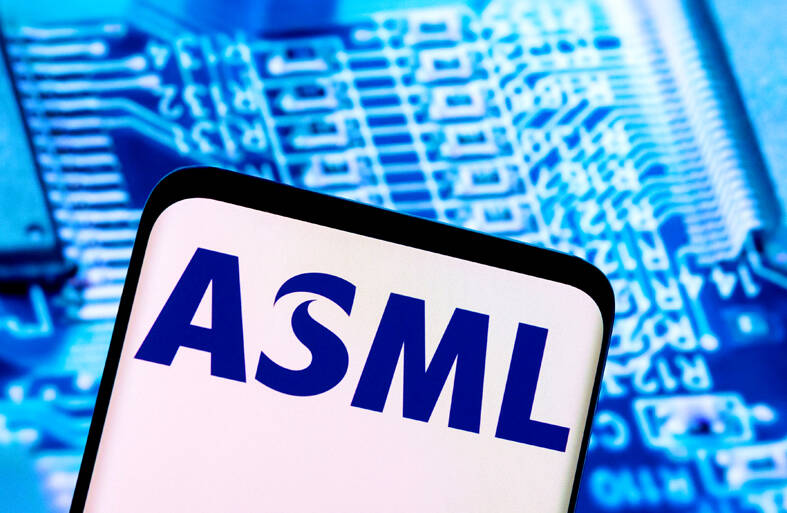The US and the Netherlands are expected to hold a new round of talks this month on restricting China’s access to advanced chip technologies, during which Washington could increase pressure on its ally to block ASML Holding NV from supplying the Asian nation.
US National Security Council Senior Director for Technology Tarun Chhabra and US Undersecretary of Commerce for Industry and Security Alan Estevez are scheduled to travel to the Netherlands for the discussions, people familiar with the plans said on the condition of anonymity.
The parties are to discuss expanding export controls, as the US has been pressuring the Dutch government to halt Veldhoven-based ASML’s sales of a wider range of its advanced chip production machines to China, although an agreement is not expected to come out of the talks, the people said.

Photo: Reuters
The trip is part of ongoing bilateral consultations, and the two sides are expected to talk about other issues in the US-Dutch tech partnership, one of the people said.
The US National Security Council, the US Department of Commerce and the Dutch Ministry for Foreign Trade and Development Cooperation all declined to comment.
ASML does not distribute its cutting-edge extreme ultraviolet (EUV) lithography systems in China, but Washington has been pushing for that prohibition to extend to more mature tech as well.
The development highlights the ongoing campaign of the administration of US President Joe Biden to convince allies to align with its export control policy, and to keep the latest chip technologies out of the reach of the Chinese military.
ASML is a linchpin of the US$550 billion global chip industry, a maker of one-of-a-kind machines without which most advanced semiconductors cannot be made. Washington needs the company on board to exert maximum pressure on China.
The global chip-equipment market is dominated by three US suppliers — Applied Materials Inc, Lam Research Corp and KLA Corp — alongside ASML and Japan’s Tokyo Electron Ltd.
All are subject to a thicket of regulations that limit what they can sell to Chinese customers, although non-US firms have more latitude in doing business with China than their US peers. That gap has grown after Washington rolled out new rules on Oct. 7 further restricting the ability of US equipment suppliers to do business in the country.
ASML has been unable to get approval from the Dutch government to sell its most advanced EUV machines to China, but so far it can continue to sell its other products to Chinese customers and sees a smaller impact than its US peers from the new US export controls.
US officials have said that the latest round of trade restrictions are expected to lose effectiveness over time if allies do not join the campaign.
They have also been pushing for ASML to halt the sale of immersion lithography machines, its second-most advanced product after EUV, to China, Bloomberg News reported earlier this year.
Estevez said last week that he expects a deal with global allies to limit shipments of chip-production equipment to China in the near term.

DIVIDED VIEWS: Although the Fed agreed on holding rates steady, some officials see no rate cuts for this year, while 10 policymakers foresee two or more cuts There are a lot of unknowns about the outlook for the economy and interest rates, but US Federal Reserve Chair Jerome Powell signaled at least one thing seems certain: Higher prices are coming. Fed policymakers voted unanimously to hold interest rates steady at a range of 4.25 percent to 4.50 percent for a fourth straight meeting on Wednesday, as they await clarity on whether tariffs would leave a one-time or more lasting mark on inflation. Powell said it is still unclear how much of the bill would fall on the shoulders of consumers, but he expects to learn more about tariffs

NOT JUSTIFIED: The bank’s governor said there would only be a rate cut if inflation falls below 1.5% and economic conditions deteriorate, which have not been detected The central bank yesterday kept its key interest rates unchanged for a fifth consecutive quarter, aligning with market expectations, while slightly lowering its inflation outlook amid signs of cooling price pressures. The move came after the US Federal Reserve held rates steady overnight, despite pressure from US President Donald Trump to cut borrowing costs. Central bank board members unanimously voted to maintain the discount rate at 2 percent, the secured loan rate at 2.375 percent and the overnight lending rate at 4.25 percent. “We consider the policy decision appropriate, although it suggests tightening leaning after factoring in slackening inflation and stable GDP growth,”

Greek tourism student Katerina quit within a month of starting work at a five-star hotel in Halkidiki, one of the country’s top destinations, because she said conditions were so dire. Beyond the bad pay, the 22-year-old said that her working and living conditions were “miserable and unacceptable.” Millions holiday in Greece every year, but its vital tourism industry is finding it harder and harder to recruit Greeks to look after them. “I was asked to work in any department of the hotel where there was a need, from service to cleaning,” said Katerina, a tourism and marketing student, who would

i Gasoline and diesel prices at fuel stations are this week to rise NT$0.1 per liter, as tensions in the Middle East pushed crude oil prices higher last week, CPC Corp, Taiwan (台灣中油) and Formosa Petrochemical Corp (台塑石化) said yesterday. International crude oil prices last week rose for the third consecutive week due to an escalating conflict between Israel and Iran, as the market is concerned that the situation in the Middle East might affect crude oil supply, CPC and Formosa said in separate statements. Front-month Brent crude oil futures — the international oil benchmark — rose 3.75 percent to settle at US$77.01